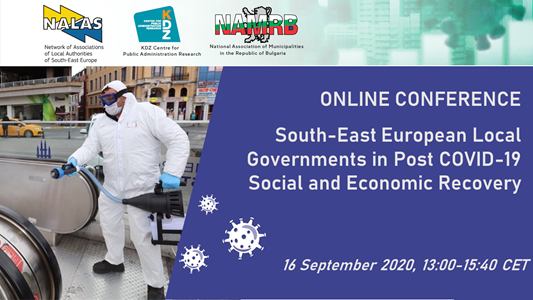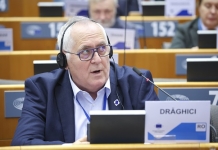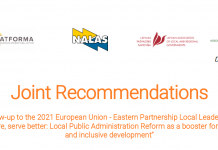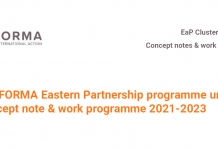South-East Europe local governments have been and will certainly remain at the forefront in responding to the COVID-19 pandemic. In such difficult times, they not only coped with the crisis, providing the necessary prevention measures, supporting vulnerable and subsidising local economies, but many of them also took a brave step forward: using innovation and digitalisation to solve the problems caused by the pandemics.
What started as a health crisis turned into the biggest economic recession since the World War II, with severe and long-lasting consequences – and it is not over. All local governments of the region have been greatly affected by the crisis, facing huge losses of revenues and extraordinary levels of uncertainty. By 2022, they may lose up to 30% of their revenues, for a total estimated loss of 17 billion Euro, which jeopardises local service provision and infrastructure investments.
More than ever, the region needs effective intergovernmental policy consultation and coordination. SEE local governments call for targeted support from central government, increased financial decentralisation, stronger local tax powers and higher intergovernmental transfers. To ensure successful recovery, local economic development must be given a priority.
These are some of the key conclusions of the Online Mayors’ Conference: South-East European Local Governments in post COVID-19 Socio-Economic Recovery, organised yesterday by NALAS, under the auspices of NALAS President Emanuil Manolov and the National Association of Municipalities in the Republic of Bulgaria (NAMRB). The conference gathered over 140 Mayors, municipal experts, representatives of NALAS member LGAs and international organisations.

Key addresses
“Looking ahead, we need to perceive the crisis also as an opportunity to improve local services and boost local development in long term”, said the President of NALAS, Mayor Emanuil Manolov in his opening speech.

“Efforts must now focus on the recovery of our communities and economies. At the same time recovery should not be an aim in itself, but also provide for sustainable development and active policies. Now, more than ever we need real vertical and horizontal cooperation, coordination and consultation between levels of government, to prevent overlapping activities and to minimise the risk of fragmented responses.
Local Government Associations play a key role in the coordination and cooperation across levels of government and therefore have an irreplaceable position in the response to the pandemic and in planning and implementing the social and economic recovery. They must be supported in these challenging tasks.
As we will see today, lessons learned and shared experience can help SEE local governments in coping with future crisis. It is our responsibility as a regional network to document this knowledge and create opportunities for effective exchange. Similarly, we need to develop also policy recommendations and support advocacy efforts of our national local government associations”, concluded Mr. Manolov.
In her key address Ms. Gunn Marit Helgesen, President of the Chamber of Regions of the Congress of Local and Regional Authorities of the Council of Europe focused on safeguarding local self-government in times of crisis, pointing out: “Unfortunately, during the crisis we have witnessed very strong recentralisation trends towards the national executive, reduction in local decision making and budgetary autonomy, imposition of measures – even push for territorial reforms – without proper consultations with local authorities, postponement of local and regional elections, and difficulties of elected councils to fulfil their duties. The crisis has had a serious impact on the functioning of democratic institutions and on local self-government in particular, prompting the Council of Europe Secretary General to issue guidance to national governments. In this guidance, the Secretary General has made it clear that any measures that change the division of competences between national, regional and local levels must be temporary and the situation must return to normal once the crisis is over.”

Presentation of the Survey
In its strong commitment to support evidence-based policy dialogue, NALAS, in partnership with KDZ and NAMRB conducted the Survey: SEE Local Governments in Post COVID-19 Socio-Economic Recovery. The purpose is to help improving the understanding over the impact of the COVID-19 crisis at the local government level in SEE, identifying effective and innovative social and economic recovery strategies and ultimately helping formulating concrete policy proposals to inform advocacy efforts of NALAS member Local Government Associations.
Mr. Thomas Prorok from KDZ presented the key survey findings, highlighting that the key challenges of South-East Europe local governments for 2020 and 2021 are related to local economy, social protection and public healthcare.

Conference Panel Discussions: Exchange of good practices
As a knowledge centre for local government development in South-East Europe, NALAS has the power to collect, formulate, disseminate and scale-up good local government practices. In this capacity, with the support of its Advisory Concilium, NALAS collected 40 good municipal practices and selected six of them to be presented at the conference, in three panels/thematic areas: 1) Community mobilisation in dealing with COVID-19, 2) Improving access and opportunities and 3) Support to local economy. Short introductory videos were developed and presented during the conference, describing each of the practices.
Panel 1: Community mobilisation in dealing with COVID-19 featured the good municipal practices by Istanbul Metropolitan Municipality, Turkey – ‘Pay It Forward’ Campaign and Colibashi, Moldova – Mobilisation of diaspora and upscaling the local brand “With love from Colibasi”.

Istanbul’s ‘Pay-It-Forward’ campaign builds upon community’s long-lasting tradition of solidarity, this time initiated by the municipality, to support vulnerable groups affected by COVID-19 and in the same time easing the financial burden of the public utility companies in difficult times. Learn more about it from the video below.










